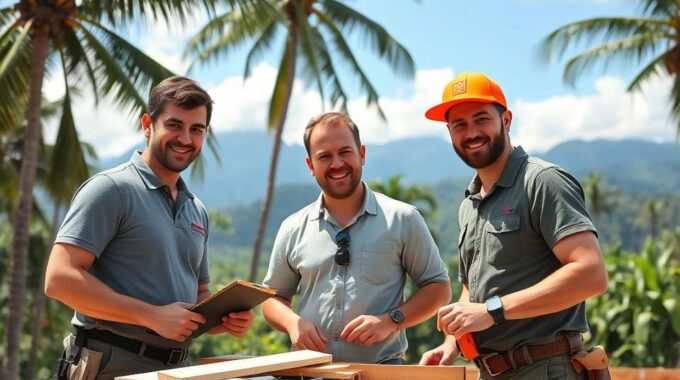Discover transparent, no-hidden-fees personal loans in Costa Rica with GAP Equity Loans. Experience fair financing and clear terms.

Expert Analysis: Asset-Based Loan Reviews in Costa Rica With GAP Equity Loans
Equity lending in Costa Rica offers investors a unique opportunity to leverage existing assets for new investments in the thriving real estate market. With the flexibility, liquidity, and potential for wealth creation it provides, equity lending has become an attractive financing option for many. When it comes to asset-based loan reviews in Costa Rica, one name stands out: GAP Equity Loans.
As a trusted partner in the Costa Rican market, GAP Equity Loans offers competitive loan options and expert guidance to ensure a successful equity loan experience. With years of experience and a deep understanding of the Costa Rican real estate landscape, they are well-equipped to assist investors and borrowers in navigating the complexities of equity lending.
Key Takeaways:
- Equity lending in Costa Rica allows investors to leverage existing assets for new real estate investments.
- GAP Equity Loans is a trusted partner offering competitive loan options and expert guidance.
- Equity lending provides flexibility, liquidity, and the potential for wealth creation.
- Choosing the right lender is crucial for a successful equity loan experience.
- Understanding the loan terms and conditions is essential before applying for an equity loan.
Understanding Equity Lending in Costa Rica
Equity lending in Costa Rica is a financing option that allows borrowers to use the equity in their property to secure a loan. This type of lending is particularly prevalent in the Costa Rican real estate market, where investors can leverage their existing assets to fund new investments or meet their financial needs. Equity loans in Costa Rica typically have a higher loan-to-value ratio compared to traditional mortgages, with lenders offering ratios of up to 70%. While interest rates for equity loans are generally higher than those for traditional mortgages, borrowers have the opportunity to negotiate the rate based on their financial situation.
One key advantage of equity lending in Costa Rica is the flexibility it offers borrowers. Unlike traditional mortgages that have specific purposes (such as purchasing a property), equity loans can be used for various purposes, including renovations, debt consolidation, or even to take advantage of investment opportunities in the real estate market. This flexibility allows borrowers to tailor the loan to their specific needs and financial goals.
It’s important for borrowers to understand the terms and conditions of equity loans in Costa Rica before committing to one. The loan duration typically ranges from 5 to 30 years, depending on the lender and borrower’s preference. Additionally, closing costs, such as appraisal fees and legal fees, should be taken into account to accurately assess the overall cost of borrowing. By having a clear understanding of the loan terms and conditions, borrowers can make informed decisions and ensure a successful equity loan experience in Costa Rica.

Table: Key Features of Equity Lending in Costa Rica
| Key Features | Description |
|---|---|
| Loan-to-Value Ratio | Lenders offer ratios of up to 70%, allowing borrowers to access a significant portion of their property’s value. |
| Interest Rates | Interest rates for equity loans are typically higher than traditional mortgages, but can be negotiated based on the borrower’s financial situation. |
| Flexibility | Equity loans can be used for various purposes, such as renovations, debt consolidation, or taking advantage of investment opportunities. |
| Loan Duration | The loan duration ranges from 5 to 30 years, depending on the lender and borrower’s preference. |
| Closing Costs | Appraisal fees and legal fees should be factored into the overall cost of borrowing. |
Types of Loans
When it comes to equity lending in Costa Rica, there are several types of loans available to borrowers. Understanding these loan options can help investors and borrowers make informed decisions about their real estate financing needs. The main types of loans for equity lending in Costa Rica include mortgage loans, real estate financing, bridge loans, and mezzanine loans.
Mortgage Loans
Mortgage loans are the most common type of loan used for purchasing properties in Costa Rica. These loans allow borrowers to finance the purchase of a property and are secured by the property itself. Mortgage loans typically have lower interest rates compared to other types of loans and offer longer repayment terms ranging from 5 to 30 years.
Real Estate Financing
In addition to mortgage loans, borrowers can also opt for specific real estate financing options. These loans are designed for renovations, construction projects, or other real estate-related expenses. Real estate financing offers flexibility in terms of loan amounts and repayment terms, allowing borrowers to tailor the loan to their specific needs.
Bridge Loans
Bridge loans provide short-term financing to bridge the gap between the purchase of a new property and the sale of an existing property. These loans help borrowers secure a new property quickly without having to wait for the sale of their current property. Bridge loans are typically used by borrowers who need immediate access to funds for time-sensitive investment opportunities.
Mezzanine Loans
Mezzanine loans are a type of financing that offers higher loan amounts with higher interest rates. These loans are often used by borrowers who need additional funds beyond what traditional mortgage loans can provide. Mezzanine loans are commonly used for large-scale real estate projects and offer flexibility in terms of repayment and loan terms.
Understanding the different types of loans available for equity lending in Costa Rica is essential for investors and borrowers. By choosing the right loan option, borrowers can meet their financing needs and achieve their real estate investment goals.

GAP Equity Loans: Your Trusted Partner in Costa Rica
GAP Equity Loans is a trusted and reliable partner in the Costa Rican real estate financing market. With years of experience and expertise, they offer a range of mortgage options to suit the needs of investors and borrowers. Whether you are looking to purchase a property, renovate an existing one, or consolidate your debts, GAP Equity Loans has the solutions you need.
What sets GAP Equity Loans apart is their commitment to providing competitive rates, flexible terms, and personalized service. They understand the unique challenges and opportunities of the Costa Rican market, and their in-depth knowledge allows them to guide borrowers through the loan process with ease.
When choosing a lender for your real estate financing needs, it is important to consider the reputation and track record of the company. GAP Equity Loans has a proven track record of success and a strong reputation in the industry. They have helped numerous investors and borrowers achieve their financial goals and make sound real estate investments.
| Benefits of Choosing GAP Equity Loans |
|---|
| Competitive rates |
| Flexible loan terms |
| Personalized service |
| Expert guidance |
| Experience in the Costa Rican market |
With GAP Equity Loans, you can be confident that you are working with a reputable and trustworthy partner for your real estate financing needs in Costa Rica. They will work closely with you to understand your unique circumstances and tailor a loan package that meets your specific needs and objectives. Whether you are a first-time investor or an experienced borrower, GAP Equity Loans is here to help you make the most of your real estate investments.

Loan Terms and Conditions
When considering an equity loan in Costa Rica, it is important to understand the terms and conditions that come with it. These terms can impact the overall cost and feasibility of the loan. Here are some key factors to consider:
Loan Rates
The interest rates for equity loans in Costa Rica are typically higher than those for traditional mortgages. This is because equity loans carry more risk for lenders. It is important to carefully review and compare different lenders to ensure you are getting the best rate possible.
Loan Duration
The duration of an equity loan can range from 5 to 30 years. This provides borrowers with flexibility in choosing a term that suits their financial needs. However, it is essential to consider the long-term financial implications and make sure you can comfortably afford the loan payments for the chosen duration.
Closing Costs
When applying for an equity loan, borrowers should factor in the closing costs associated with the loan. These costs include appraisal fees, legal fees, and other administrative expenses. It is important to budget for these costs and include them in your overall cost of borrowing.
By understanding and carefully evaluating the loan terms and conditions, borrowers can make informed decisions and set realistic expectations for their equity loan in Costa Rica.
Collateral Requirements for Equity Loans in Costa Rica
When considering equity loans in Costa Rica, it is important to understand the collateral requirements that lenders have in place. Most equity loans in Costa Rica require collateral, typically in the form of real estate. The collateral serves as security for the loan and allows lenders to offer lower interest rates compared to unsecured loans. The value of the collateral is determined through property valuation, which takes into account factors such as location, condition, and market trends. The loan-to-value ratio, which refers to the percentage of the loan amount compared to the appraised value of the collateral, is also a crucial factor in determining eligibility and loan terms.
By using real estate as collateral, borrowers can provide lenders with assurance that they have an asset of value to back up the loan. This reduces the lender’s risk and allows them to offer more favorable terms, such as lower interest rates and longer repayment periods. It is important for borrowers to carefully consider the collateral they are offering and ensure that its value is sufficient to meet the loan requirements. Additionally, borrowers should be aware that if they default on the loan, the lender has the right to seize the collateral to recover their losses.
Some lenders may have specific requirements regarding the type of collateral they accept. For example, certain lenders may only accept residential properties as collateral, while others may accept commercial properties as well. It is important for borrowers to thoroughly review the collateral requirements of potential lenders and ensure that their chosen property meets the criteria. Consulting with a trusted advisor or attorney can help borrowers navigate the complexities of collateral requirements and make informed decisions.
Overall, understanding the collateral requirements for equity loans in Costa Rica is essential for borrowers seeking financing options. By ensuring that they have suitable collateral and meeting the loan-to-value ratio, borrowers can increase their chances of securing favorable loan terms and successfully accessing the funds they need.

Benefits of Equity Lending in Costa Rica
Equity lending in Costa Rica offers several key benefits for borrowers looking to leverage their existing assets. These benefits include:
- Flexibility: Equity lending provides borrowers with the flexibility to use the funds for various purposes, such as property acquisitions, renovations, or debt consolidation. Whether you’re looking to expand your real estate portfolio or improve your current property, equity lending gives you the freedom to access the funds needed.
- Liquidity: By tapping into the equity of your property, you can quickly access cash for time-sensitive investment opportunities. This liquidity can be invaluable when you come across a great deal or need funds for other urgent financial needs.
- Wealth Creation: Equity lending allows borrowers to unlock the potential for wealth creation through real estate investments. By investing in the Costa Rican market, you have the opportunity to generate long-term returns and build your assets over time.
Equity lending in Costa Rica offers flexibility, liquidity, and the potential for wealth creation in the real estate market.
Whether you’re an investor looking to expand your portfolio or a homeowner seeking additional funds, equity lending in Costa Rica can be a valuable tool. The ability to leverage your existing assets can open up new opportunities, provide quick access to cash, and pave the way for long-term financial growth.
By working with a trusted partner like GAP Equity Loans, borrowers can navigate the equity lending process with ease and confidence. Their expertise and personalized service ensure that your equity loan experience in Costa Rica is both successful and rewarding.
Conclusion:
Equity lending in Costa Rica offers borrowers flexibility, liquidity, and the potential for wealth creation in the real estate market. Whether you’re looking to invest or need funds for other financial goals, equity lending can provide the resources you need. By understanding the benefits and working with a trusted partner, borrowers can make the most of their equity loan experience in Costa Rica.

Factors to Consider Before Getting an Equity Loan in Costa Rica
When considering an equity loan in Costa Rica, there are several important factors that borrowers should take into account. These factors can greatly impact the overall success and financial implications of the loan. By carefully considering property valuation, the financial implications, and choosing the right lender, borrowers can make informed decisions and ensure a successful equity loan experience.
Property Valuation
Before applying for an equity loan, it is crucial to accurately assess the value of your property. Property valuation not only determines the loan-to-value ratio but also plays a key role in determining the amount of the loan and the interest rates offered by lenders. Hiring a professional appraiser to evaluate your property can provide an accurate valuation and give you a better understanding of your borrowing potential.
Financial Implications
Understanding the financial implications of an equity loan is essential. Borrowers should carefully consider the interest rates, loan duration, and closing costs associated with the loan. It is important to calculate the monthly payments and assess the impact on your financial situation. Taking the time to evaluate the long-term financial implications can help you make an informed decision and ensure that the loan aligns with your goals and budget.
Choosing the Right Lender
Selecting the right lender is a crucial step in the equity loan process. It is important to research and compare different lenders to find the one that best meets your needs. Consider factors such as interest rates, loan terms, customer service, and the lender’s reputation in the market. Working with a trusted and reputable lender can provide peace of mind and ensure a smooth and successful equity loan experience.
| Factors to Consider | Property Valuation | Financial Implications | Choosing the Right Lender |
|---|---|---|---|
| Definition | The process of determining the value of your property | The impact of the loan on your financial situation | Selecting a reputable lender with favorable terms |
| Importance | Allows for accurate loan-to-value ratio calculation | Helps evaluate affordability and long-term financial impact | Affects interest rates, loan terms, and overall loan experience |
| Considerations | Hire a professional appraiser for accurate valuation | Calculate monthly payments and assess impact on finances | Research and compare lenders based on rates and reputation |
By considering these factors before getting an equity loan in Costa Rica, borrowers can make informed decisions and ensure a successful borrowing experience. Taking the time to evaluate property valuation, financial implications, and choosing the right lender can help borrowers secure the financing they need while minimizing risks and maximizing the benefits of an equity loan.

Securing Your Investment with Costa Rican Equity Loans
Costa Rica’s thriving real estate market presents lucrative investment opportunities for buyers looking to secure their investments for long-term asset appreciation. One effective financial tool that can help investors achieve their goals is the equity loan. By leveraging the equity in their existing properties, investors can access the necessary funds to acquire new properties, undertake renovations, or make improvements that can enhance the value of their real estate holdings.
Equity loans in Costa Rica provide a flexible financing option that allows investors to tap into the potential of their properties. This type of loan enables investors to unlock the financial value of their existing assets, providing the necessary liquidity to pursue new opportunities in the real estate market. By securing their investments with equity loans, investors can strategically navigate the Costa Rican real estate landscape and position themselves for long-term growth and wealth accumulation.
“Equity loans in Costa Rica provide a valuable financing option for investors looking to secure their investments in the real estate market.”
Investors who choose to secure their investments with equity loans must carefully consider the terms and conditions of such loans. Factors such as interest rates, loan duration, and closing costs should be thoroughly assessed to ensure that the financial implications align with their investment strategy. Additionally, choosing the right lender is crucial for a successful equity loan experience. Researching and comparing different lenders can help investors find a trusted partner with competitive rates and personalized service.
By utilizing Costa Rican equity loans, investors can effectively secure their investments and position themselves for long-term asset appreciation. This financing option unlocks the potential of existing properties, providing the necessary funds to pursue new opportunities and maximize returns in the thriving Costa Rican real estate market.

Tips for a Successful Equity Loan Experience in Costa Rica
When considering an equity loan in Costa Rica, it is crucial to choose the right lender to ensure a successful borrowing experience. Here are some tips to help you make informed decisions:
Research and Compare
Take the time to research and compare different lenders in Costa Rica. Look for lenders who specialize in equity lending and have a strong reputation in the market. Consider factors such as interest rates, loan terms, and customer service. Reading reviews and testimonials can also provide valuable insights into the experiences of previous borrowers.
Consider Factors
Before committing to an equity loan, consider various factors that can impact your borrowing experience. Evaluate the interest rates offered by different lenders and compare them to your financial situation. Think about the loan duration and determine if it aligns with your long-term goals. Additionally, factor in any closing costs associated with the loan, such as appraisal fees and legal fees.
Choose the Right Lender
Choosing the right lender is essential for a successful equity loan experience. Look for a lender that understands the Costa Rican market and has experience in equity lending. Consider their level of expertise, personalized service, and willingness to guide you through the loan process. A lender who is responsive, transparent, and trustworthy can make a significant difference in your borrowing journey.

| Lender | Interest Rates | Loan Duration | Customer Service |
|---|---|---|---|
| GAP Equity Loans | Competitive | Flexible terms | Personalized guidance |
| Other Lender 1 | Higher rates | Fixed terms | Standard service |
| Other Lender 2 | Varying rates | Varying terms | Mixed reviews |
Table: A comparison of lenders in Costa Rica
Choosing the right lender is crucial for a successful equity loan experience. GAP Equity Loans stands out with competitive interest rates, flexible loan terms, and personalized guidance. Other lenders may have higher rates, fixed terms, or mixed reviews. It is essential to consider the specific offerings of each lender and choose the one that best aligns with your financial goals and preferences.
Exploring Gap Loans in Costa Rica
In the realm of financial stability, bridge financing plays a pivotal role in ensuring individuals and businesses in Costa Rica can navigate through uncertain economic times. Gap loans, specifically, have emerged as a crucial financing option, serving as a bridge between current financial situations and the desired stability. These short-term loans offer flexibility and accessibility, providing borrowers with the necessary funds to address immediate needs and seize opportunities. Whether it’s a business facing temporary cash flow challenges or an individual looking to bridge the gap before a property sale, gap loans can provide the necessary financial support.
One of the key advantages of gap loans is their quick approval process, allowing borrowers to access the funds they need in a timely manner. Traditional loans can often be time-consuming and require extensive documentation, but gap loans offer a more streamlined application process. This expedited approval timeline can be crucial in urgent situations where time is of the essence.
“Gap loans serve as a vital tool for borrowers who need immediate financing solutions. These short-term loans fill the gap between transactions, providing the liquidity required to bridge financial needs.”
Moreover, gap loans can be obtained from various sources, including commercial banks, credit unions, and private lending institutions. This wide range of options allows borrowers to choose the lender that offers the most favorable terms and conditions, ensuring they can secure financing that aligns with their specific financial goals and requirements.

Key Benefits of Gap Loans:
- Quick approval process
- Flexibility and accessibility
- Wide range of lenders to choose from
- Ability to bridge financial gaps efficiently
Overall, gap loans provide a valuable financial solution for individuals and businesses in Costa Rica, offering a means to address short-term financing needs and achieve financial stability. By exploring the options available and choosing the right lender, borrowers can navigate through challenging economic times with confidence and seize opportunities for growth.
| Pros | Cons |
|---|---|
| Quick approval process | Higher interest rates compared to traditional loans |
| Flexibility and accessibility | Shorter loan terms |
| Wide range of lenders to choose from | May require collateral |
| Ability to bridge financial gaps efficiently |
Conclusion
Equity lending and gap loans offer valuable financing options for investors and borrowers in Costa Rica. These options provide flexibility, liquidity, and the potential for wealth creation in the real estate market. By leveraging their existing equity, borrowers can tap into funds for property acquisitions, renovations, or debt consolidation, allowing them to seize time-sensitive investment opportunities.
Before applying for an equity loan, borrowers should carefully consider the loan terms and conditions. Interest rates for equity loans are typically higher than traditional mortgages, and closing costs should be factored into the overall cost of borrowing. It is essential to choose the right lender, conducting thorough research and comparing the services and terms offered by different providers to ensure a successful equity loan experience.
Additionally, gap loans serve as a vital bridge financing option in Costa Rica, providing flexibility and accessibility. These short-term loans help borrowers navigate through economic uncertainties and achieve financial stability. Whether obtained from commercial banks, credit unions, or private lending institutions, gap loans can bridge the gap between the borrower’s current financial situation and their desired stability.
In conclusion, by understanding the loan options available, considering various factors, and making informed decisions, borrowers can maximize the benefits of equity lending and gap loans in Costa Rica. These financing options not only support the growth of the real estate market but also offer individuals and businesses the opportunity to secure their investments and achieve long-term asset appreciation.
FAQ
What is equity lending in Costa Rica?
Equity lending in Costa Rica refers to a form of financing where borrowers use the equity in their property to secure a loan.
What is the loan-to-value ratio for equity lending in Costa Rica?
Lenders in Costa Rica offer loan-to-value ratios of up to 70% for equity lending.
What types of loans are available for equity lending in Costa Rica?
Mortgage loans, real estate financing options, bridge loans, and mezzanine loans are available for equity lending in Costa Rica.
What does GAP Equity Loans offer as a trusted partner in Costa Rica?
GAP Equity Loans offers competitive rates, flexible terms, and personalized service for investors and borrowers in Costa Rica.
What factors should borrowers consider before applying for an equity loan in Costa Rica?
Borrowers should consider the loan terms and conditions, including interest rates, loan duration, and closing costs.
What collateral is required for equity loans in Costa Rica?
Most equity loans in Costa Rica require real estate collateral to secure the loan.
What are the benefits of equity lending in Costa Rica?
Equity lending in Costa Rica offers flexibility, liquidity, and the potential for wealth creation through real estate investments.
What factors should borrowers consider before getting an equity loan in Costa Rica?
Borrowers should consider factors such as property valuation, financial implications, and choosing the right lender.
What are gap loans in Costa Rica?
Gap loans in Costa Rica serve as short-term financing options to bridge the gap between the current financial situation and desired stability.
What are some tips for a successful equity loan experience in Costa Rica?
Tips include researching and comparing lenders, considering various factors, and making informed decisions.
Source Links
- https://www.gapequityloans.com/en/equity-lending-in-costa-rica/
- https://gap.cr/gap-loans-for-mitigating-financial-uncertainties-in-costa-rica/
- https://www.ilo.org/wcmsp5/groups/public/—ed_protect/—soc_sec/documents/publication/wcms_758705.pdf
Article by Glenn Tellier (Founder of CRIE and Grupo Gap)



